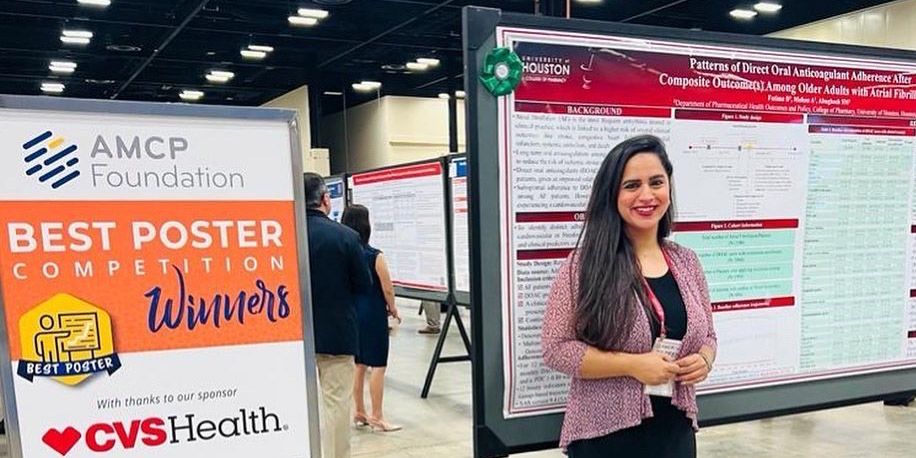Research News
Adherence Awarded
UHCOP Graduate Student Wins AMCP Best Poster for Atrial Fibrillation Adherence Study
April 19 — A retrospective study of medication nonadherence factors among older adult atrial fibrillation (AF) patients could help health care providers identify those at-risk of experiencing cardiovascular events, such as stroke or congestive heart failure, according to an award-winning study by a University of Houston College of Pharmacy Ph.D. student.
Bilqees Fatima, Pharm.D., M.S., who is in the Pharmaceutical Sciences-Pharmaceutical Health Outcomes and Policy Concentration doctoral degree program, received the AMCP Foundation Best Poster Award in the Graduate Student category at the Academy of Managed Care Pharmacy's 2023 Meeting March 21-23 in San Antonio.
Co-authored by Anjana Mohan, Ph.D., a recent UHCOP graduate and current observational research manager at Amgen, and faculty advisor Susan Abughosh, Ph.D., UHCOP professor, the study identified atrial fibrillation (AF) patients enrolled in a Texas-based Medicare Advantage Plan who were prescribed a DOAC between July 2016 and December 2017. Patients who experienced a clinical outcome such as stroke or congestive heart failure and met the requirements were then further analyzed.
"Medication non-adherence is a significant problem in health care, as it can lead to poor health outcomes and increased health care costs," Fatima said.
AF is linked to a higher risk of cardiovascular events, including stroke, congestive heart failure, myocardial infarction, systemic embolism, and bleeding events. Although long-term direct oral anticoagulant (DOAC) use has been shown to reduce the risk of embolic events and is favored over the drug warfarin for improved safety profile, suboptimal adherence to DOACs is common among AF patients.
The results of the study show that over 60% of AF patients who had experienced a clinical event followed non-adherent trajectories, with aspects such as low-income subsidy, age, presence of coronary artery disease and the use of NSAIDs factoring in.
Fatima's research confirmed one-year adherence among DOAC users is suboptimal, but the identified predictors of nonadherence should be taken into consideration when developing future interventions.
"These insights could inform the development of targeted interventions to improve medication adherence in such high-risk patients and ultimately improve health outcomes," Fatima said.
UHCOP Ph.D. candidate Zahra Majd, Pharm.D., who won the AMCP Foundation Best Poster Award at AMCP 2022, also was among this year's nominees for her project, "Trajectories of adherence to ACEI/ARB medications following a motivational interviewing intervention among Medicare Advantage beneficiaries in Texas."
— Logan Linder
